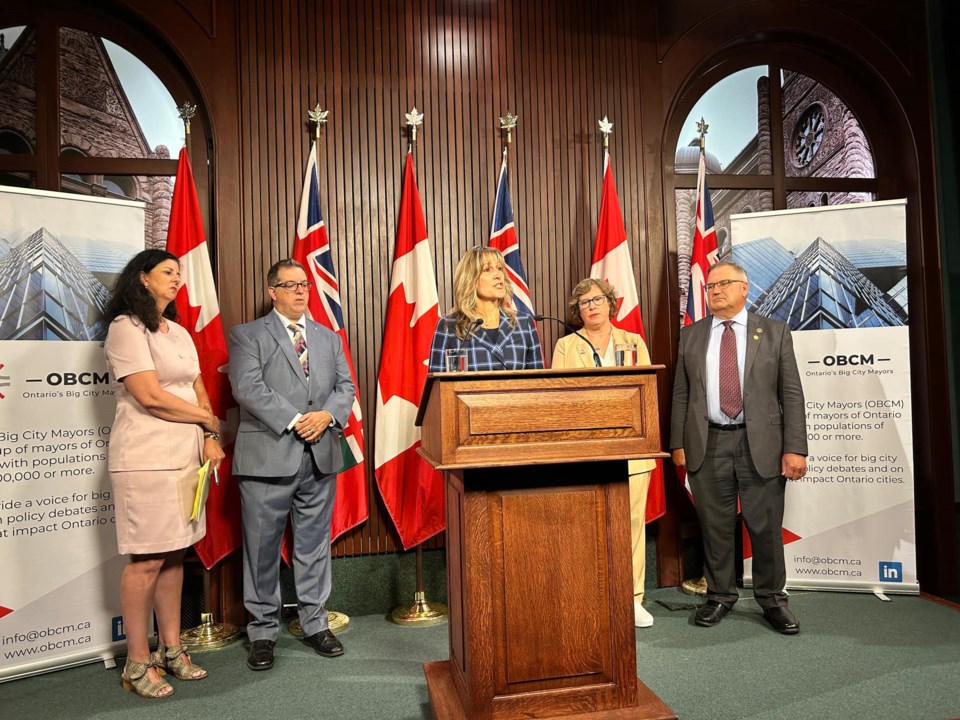EDITOR’S NOTE: This article originally appeared on The Trillium, a Village Media website devoted to covering provincial politics at Queen’s Park.
Beset by thousands sleeping on their streets with no end in sight, big city mayors are calling for more leadership from Ontario — including a single point of contact and more stable funding.
Municipalities say they're having to spend millions dealing with homelessness and addiction, which they have long argued fall under the province's responsibility as health and social issues.
Halton Region is spending about $16 million a year in property taxes — about four or five per cent of its budget — "subsidizing the province," Burlington Mayor Marianne Meed Ward told journalists on Thursday.
"Property tax is a very regressive tax. It's not based on income. It's not based on economic development. And it wasn't what property taxes were intended for," she said.
There are more than 1,400 encampments across Ontario — "a result of long-term underinvestment by successive provincial governments," AMO President Colin Best said.
Camille Quenneville, CEO of the Canadian Mental Health Association, Ontario Division, said her organization is "overwhelmed" by the drug crisis. She said the province needs 100,000 supportive housing units just to deal with the wait list.
If the province had done what she asked in 2015 and spent $30 million a year on supportive housing — a drop in the bucket in Ontario's budget — "we wouldn't be having these conversations," she said.
Ontario's Big City Mayors (OBCM), made up of 29 of the province's largest municipalities, came to Queen's Park on Thursday to call on the Ford government to designate one ministry as a "single point of contact" for the homelessness crisis, including mental health, addictions and wraparound supports.
Meed Ward, the OBCM's chair, said she learned in a recent meeting with the province that "something like 16 ministries" touch the issue.
"So who's calling them all together?" she said.
The newly in-charge minister should then develop an action plan that includes stable, annual funding, the mayors said.
While the mayors stressed — repeatedly — that they're thankful for the current provincial cash, they said the "piecemeal" formula isn't working.
"We have been raising this issue over and over again for so many years," Guelph Mayor Cam Guthrie said.
Right now, cities have to "wait for a funding announcement, or allocation program to open, hope that you qualify, hope that your application will get across the finish line, wonder if you're gonna get what you asked for, or some percentage of that," Meed Ward said.
"That is not how to run a country. It's not how to run a province."
"You can't say, 'We're going to do this multimillion-dollar supportive housing (project) not knowing if the funding is going to be there," she said.
Housing Minister Paul Calandra's office noted that it spends $700 million per year on community and supportive housing and added $396 million over three years for mental health and addictions services.
"We continue to call on the federal government to step up, pay their fair share and take more responsibility for the consequences of their policies that have escalated the number of individuals facing homelessness," Calandra's spokesperson, Bianca Meta, said in a statement.
"The recent disastrous examples of British Columbia and other jurisdictions has shown decriminalization does not work. Instead, it encourages dangerous behaviour in public spaces, victimizes innocent people and undermines law enforcement’s ability to protect our communities," Meta added.
The mayors did not ask for, or even mention, decriminalization. They also avoided much talk of safe consumption sites, which the Ford government is no fan of.
"We just want people that are, first of all, able and willing to get treatment to have a bed. We don't even have that right now," Meed Ward said.
Done right, increasing funding will save money, Meed Ward said, noting that one person in London had gone to the hospital 300 times.
"If you need an overnight stay, it can be thousands of dollars," she said.
Asked about homelessness on Wednesday, Premier Doug Ford said he'd keep building housing, and noted that 230,000 jobs are available in Ontario.
"So if they're healthy, they should be working. And they aren't healthy. We will take care of them," he said.
The mayors agreed that this is the top issue they'll be taking to the Association of Municipalities of Ontario (AMO) conference in less than two weeks' time, where they'll have a flurry of 10-to-15-minute meetings with ministry staff and — if they're lucky — ministers themselves.
NDP Leader Marit Stiles, who has been on a push to win over municipalities of late, promised cities a new deal under her rule.
"Doug Ford and his politicians, like the Liberals before them, have left municipalities holding the bag for areas of provincial responsibility like health care, mental health supports, affordable and supportive housing," she said in a statement. "As premier, I will make sure provincial responsibilities are paid for by the province in a new partnership with cities, based on respect."
